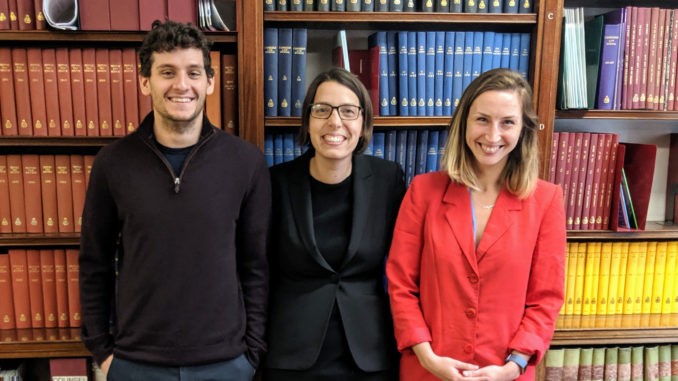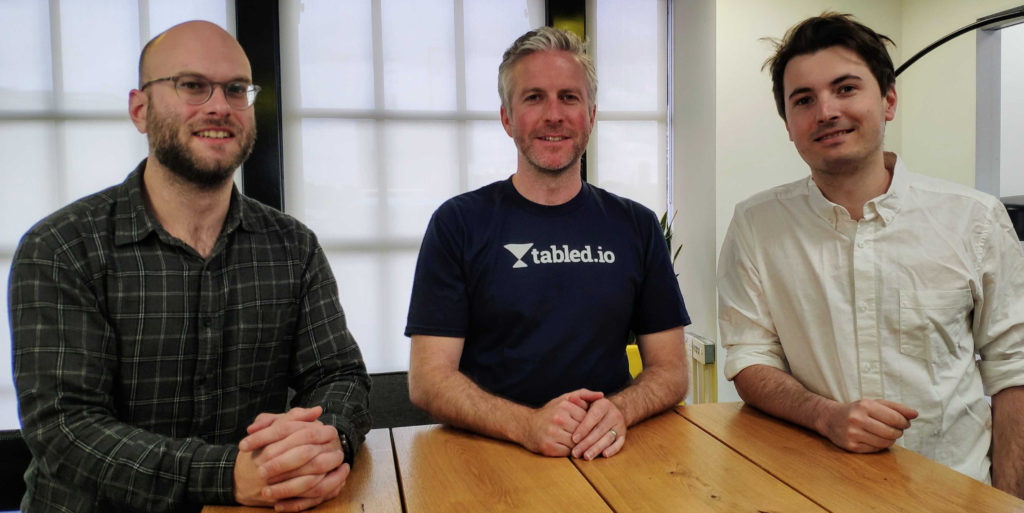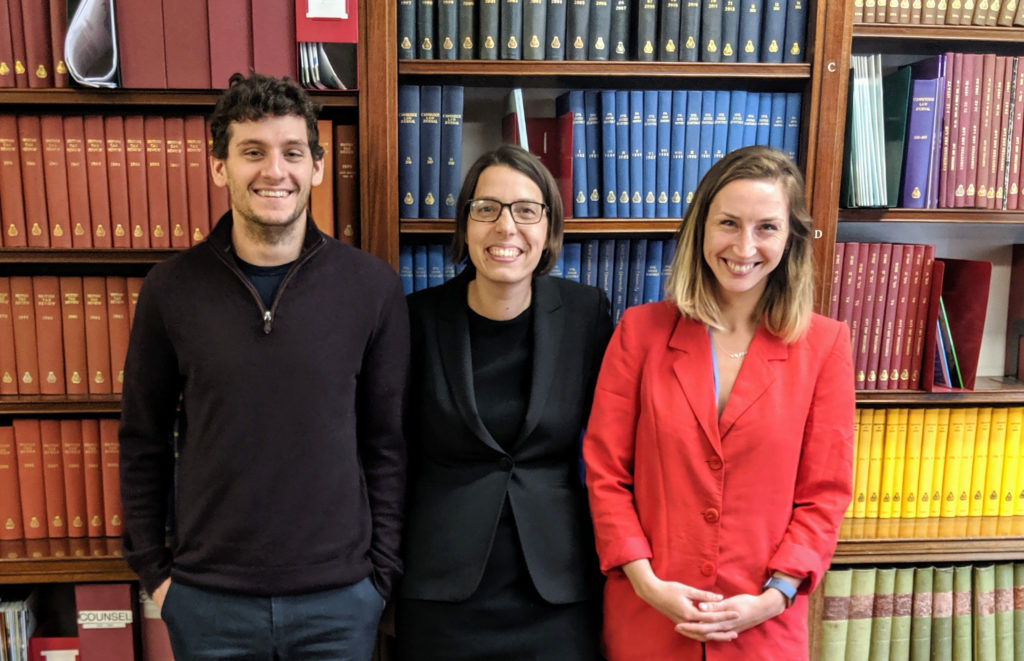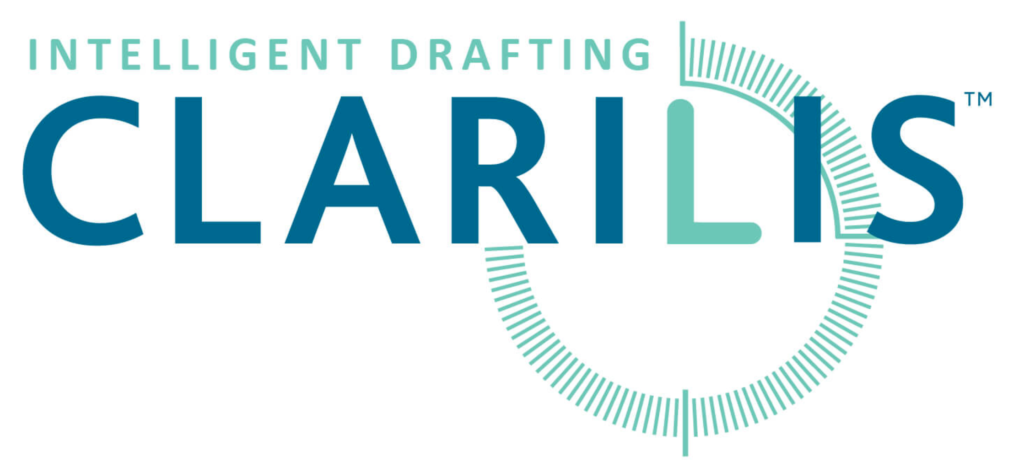
In April, Magic Circle law firm, Slaughter and May, announced its first cohort of legal tech companies for its Collaborate incubator. Artificial Lawyer asked three of the cohort what motivated them to join up, what they’ve got out of the experience so far, and what it’s been like working with the lawyers at one of the world’s leading firms. This is what they said.
Tabled
Why did you choose to apply for Collaborate?
Tabled is a workflow platform enabling in-house legal teams to manage and analyse their workflows and it also connects in-house teams to law firms. We are based in the Founders Factory incubator which gives us exposure to large corporates such as M&S and we are also working with a number of scale-up companies such as Monzo to help develop our product.
However, we were looking for law firm partners so we applied to the Slaughter and May Collaborate programme to gain insights from the Slaughter and May lawyers and their client panel.
Collaborate also seemed to provide the right balance of hands on and flexible interaction which would work well alongside our commitments in the Founders Factory incubator which is a pretty intensive startup programme itself.
What has the experience been like, is it what you expected working with a firm such as Slaughter and May?
The experience has been just right for us at Tabled and the team at Slaughter and May have made us feel completely welcome and at ease throughout. The programme has been carefully curated to cover a good range of subject matter and feedback with the right number of touch points so that it works well alongside running the business.
During my legal career I hadn’t worked with the firm before and although I knew they supported fintech startups, I had not necessarily associated the firm with legal tech innovation beyond their early investment in Luminance.
The programme has demonstrated that the firm really thinks about the application of technology to legal practice and service provision and has done so for a long time. This ranges from a commitment to training trainees on the use of technology and the depth of knowledge and interest in the Collaborate startups from across the firm has been very welcome.
What has been the reaction from the lawyers and innovation team at Slaughter and May to your application and what have you learned from interacting with them?
The applications were considered by an array of stakeholders and the feedback was that the client panel had a need for the workflow products which we are developing. This was very encouraging given that our initial product is targeted at in-house teams and it has played out as the Slaughters team have introduced us to these clients!
During the programme we have had a very positive response from the Slaughter and May team. Focus groups and demo sessions have all been well attended with people from across the firm, including lawyers and support functions. This demonstrates the interest in legal tech and innovation from across the firm. We’ve been able to validate our proposition and find new important features to build.
We have learned that common themes emerge when you are talking to in-house and private practice lawyers about their everyday work and pain points and about the strategies for driving adoption of legal technologies. However, the unique needs of each of these separate parts of the legal market are important to distinguish when developing products. We might keep the golden nuggets of value to ourselves until we have released our product for law firms!
Last question, what is the most important lesson the experience has taught you overall and has this changed your business plan as a company?
Slaughter and May, as an elite law firm, has maintained its core traditions and values to enhance its market leading position, but has for a long period recognised the importance of innovating with technology and startup collaboration to enhance its value proposition to clients.
The lesson that we at Tabled take away from this observation is that there is a desire to change at all levels of the ecosystem, not only consuming legal tech offerings but also co-creating it with startups and other stakeholders. This gives us a deep sense of encouragement and purpose, to continue creating a market defining platform with our clients, to bring further collaboration and transparency to more in-house teams and law firms.

—
Clarilis
Why did you choose to apply for Collaborate?
We were very keen to work with Slaughter and May’s excellent knowledge and innovation teams and the firm’s clients and industry experts that are participating in Collaborate. This mix of opinions and perspectives is just what we were looking for in an innovation programme.
Slaughter and May are known globally for quality and client service and we endeavour to replicate those high standards here at Clarilis. Our CEO (James Quinn) also trained and practised at the firm so it was a natural fit.
What has the experience been like, is it what you expected working with a firm such as Slaughter and May?
Extremely positive. The programme has a full itinerary and is very well organised – as you would expect. Each of our cohort has a dedicated innovation/knowledge manager and practising lawyer contact to guide them through the programme. We are working with Richard Batstone and Helen Emanuel (team Clarilis) who have been great so far. The mixture of cohort and dedicated Clarilis sessions makes the programme much more valuable than anticipated.
What has been the reaction from the lawyers and innovation team at Slaughter and May to your application and what have you learned from interacting with them?
We are very pleased they chose Clarilis from a wide ranging and quality field of applicants. The Slaughter and May team are very keen to add value through the process, including by helping to shape our technology roadmap and by actively providing feedback on our automation system and process.
Last question, what is the most important lesson the experience has taught you overall and has this changed your business plan as a company?
We have been through a period of explosive growth here at Clarilis over the last 12 months. Whilst scaling, it is crucial that we maintain quality, which requires a continual process of reviewing and improving every aspect of our offering. The programme has been really useful in that regard.
High quality, actionable feedback directly from law firms and in-house teams really helps. We are listening and changing aspects of our plans to ensure that we continue to deliver practical features that firms and in-house teams want to use- always with a focus on a measurable ROI.
—
Just: Access
Why did you choose to apply for Collaborate?
JUST: Access is a small social enterprise that has a lot to learn about how lawyers and business support services carry out their day to day tasks. We had a lot of assumptions about working practices and wanted to test these. We also knew that security was important but wanted to learn more about the finer details. This programme provided an amazing opportunity for us to test our assumptions, learn more and gain exposure to a wide variety of speakers and experts.
What has the experience been like, is it what you expected working with a firm such as Slaughter and May?
We have felt welcomed and treated with upmost respect. Our mentors, Stella and Elizabeth have time and again gone out of their way to provide us with access to the right people and always make sure they say hello whenever we’re in the building.
At first we were surprised by Slaughters’ level of information and IT security! But it was these moments that gave me confidence in the firm. At our practice pitch, we were blown away by the amount of staff that gave up their lunchtime to come and watch and were very grateful for the high audience engagement. It felt like nearly everyone in the room had a question, which was fantastic!
What has been the reaction from the lawyers and innovation team at Slaughter and May to your application and what have you learned from interacting with them?
We were given some little tips along the way that have proven really helpful (regarding our pitch deck, for example) and have taken a lot out of the sessions held by the firm as part of the programme, such as the InfoSec session and the Cohort day. The socialising sessions have been equally fruitful. We are grateful to the programme mentors, who have been willing to talk to all of the teams on the programme.
One mentor, in particular, while chatting during the first session, offered us the opportunity to speak with both himself and his trainee regarding a meeting that they were having at the end of that week, in which we were able to get some truly unique insights into the reality of what it is like as a lawyer. This led us to form a new use case for our product that we had never thought of before and is now our most relevant and powerful use case!
Last question, what is the most important lesson the experience has taught you overall and has this changed your business plan as a company?
Tough question! There are many, but I think the most important lesson is to remain flexible, ask the question and listen. We did not think that our little social enterprise would even be noticed by a firm like Slaughter & May, but they have been incredibly helpful and responsive to our asks.
As a company, we have taken the time to reflect on the experience and have altered our business plan slightly as a result. In particular, we are looking to other law firms who may be experiencing the same issues and undertaking the same working practices to see if they may also benefit from our service.

—
Thanks to all three companies for your responses. Looks like it’s been a valuable experience so far. Collaborate’s first cohort is expected to complete the programme in July this year.



1 Trackback / Pingback
Comments are closed.